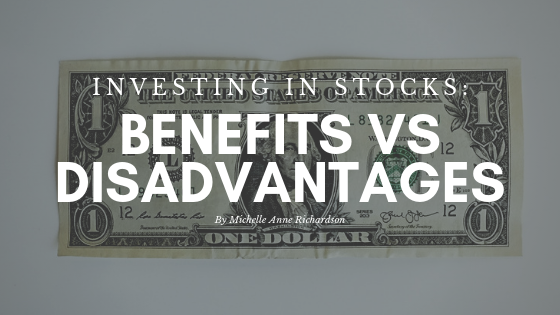The market crash in 2008 and 2009 caused many people to rethink the wisdom of investing in the stock market. Those who held on for the ride have more than recovered their losses as the market has hit many new highs in recent years. Those who held their positions and added money throughout the past ten years have done even better. Just like all investments, stocks have advantages and disadvantages.
Benefits
Stocks Offset Inflation
Those who put money into a traditional savings account will lose buying power over time. This is due to the inflation of the money supply over the years. Even at 2 or 3 percent per year, inflation can take a big bite out of the value of a person’s money stash. Stocks offset the effect of inflation because they tend to grow in value more than the rate of inflation.
Liquidity
Stocks provide a great deal of liquidity for investors. If there’s a reasonable price on a great company, it’s possible in the Internet Age to buy shares with a few clicks. The same is true when it comes time to sell. The trades are nearly instantaneous. This ease of liquidity is a significant advantage when compared with investments like houses.
Stocks Provide Income
There are a couple of ways that stocks can provide income. Some investors harvest capital gains for living expenses. Others will choose to take advantage of the dividends that companies pay out periodically. Regardless, stocks can provide income for investors.
Disadvantages
Total Loss
Depending upon the investment, an investor could lose all of the capital they put toward buying shares of a company. Shareholders are paid off last should a company go out of business. While not every company will go bankrupt, some will, and there will be investors who lose money.
Stocks Are Volatile
While market volatility can provide a solid buying opportunity, it can also lead to fear. Stocks go up and down, nearly every second. When shares are down, investors might be tempted to sell a good company.
Stocks Take Time To Pay Off
Except for those who are early investors in cutting-edge companies, it can take quite a bit of time to make real money. While the market, as a whole, returns about 10 percent on average, it takes more than seven years to double an investment in that scenario. Compounding returns through capital gains and dividends will take time to materialize.
Stocks can be a great investment. They can lead to real wealth building. However, there are also some disadvantages. Therefore, prospective investors should take both the advantages and disadvantages into account before making their investment choices.

